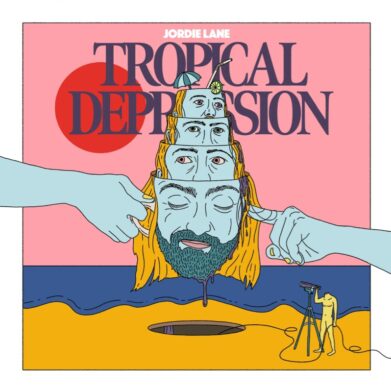
Jordie Lane releases an electrifying new album ‘Tropical Depression’, an intersection of Americana and folk.
Courtesy of Sarah J Frost @ SJF Public Relations
The album is also a new entry in his ever-evolving sound, wandering near the intersection of Americana and 60s-inspired folk. Packed with humor, wit and sharp social commentary, Tropical Depression tackles a broad range of topics, from battling extreme weather—sparked by a close brush with an EF-3 tornado—to Lane’s own mental health struggles.
The album opens with “Back Out, There,” one of Lane’s personal favorites. The song exists in a whirlwind universe where the lyrics have been torn apart by a twister, leaving everything in a frenzy. Lane penned “The Changing Weather,” after returning to the U.S. following devastating bushfires in Australia, only to then encounter an EF-3 tornado in Nashville. In the song, he searches for clarity amid the chaos of increasingly frequent climate-related disasters.
Lane recently released “Biscuit House,” along with an accompanying video that perfectly captures the song’s humorous essence.“Long story short, ‘Biscuit House’ is about imposter syndrome,” Lane told The Bluegrass Situation. “Something so many people feel at some point in their lives, but especially creatives in the arts.”“As with so many of my songs, I started out writing ‘Biscuit House’ with co-writer Clare ‘Lollies’ Reynolds about something external… somebody else,” he continues. “It’s a way to trick yourself into feeling less vulnerable. And it’s a way to observe the character in a more realistic and less biased way.”
Lane has earned a reputation for his inventive use of unconventional spaces to create stunning records. His 2011 album Blood Thinner was recorded in a desert motel in Joshua Tree, California, using little more than a cassette recorder. His critically acclaimed album, Glassellland, took shape in a series of AirBnBs across Los Angeles. Continuing this tradition, Tropical Depression had an unexpected origin—the album’s first track, “Empty Room,” was birthed in a vacant rental home, without air conditioning or running water.
Tropical Depression concludes with “Been Lucky,” a powerful endnote that contrasts the album’s opening with a message of hope, even in the face of overwhelming odds.
The album was mixed by the renowned Noah Georgeson (The Strokes, Devendra Banhart, Andy Shauf, Marlon Williams) and mastered by Juno Award-winning Philip Shaw Bova (Feist, Father John Misty, Angel Olsen, Bahamas).
Born to a comedian and a clown, Lane’s early years were spent in a traveling circus, an unconventional upbringing that has undeniably shaped his artistic journey. A seasoned road warrior, Lane has shared the stage with legendary acts like Billy Bragg, The Moody Blues, Gotye, Old Crow Medicine Show, Marlon Williams, Kim Richey, Eilen Jewell, and Caroline Spence, among others. He has also graced the stages of major festivals across the US, UK, Australia, and Canada, including West Coast Blues & Roots, Port Fairy, Queenscliff, and Woodford, along with Philadelphia, Sisters, Calgary, and Winnipeg folk festivals.
Throughout Tropical Depression, Lane embarks on a raw exploration of his inner world—challenges and all—seeking a deeper connection with the world around him. He confronts societal norms and structures, both in the U.S. and in Music City, his adopted home, and contemplates what it means to face the literal and metaphorical storms head-on to carve out a better path forward.
The release of Tropical Depression marks the beginning of what’s next for him, and his music—it’s an album that promises to resonate deeply and linger long after the final note.



